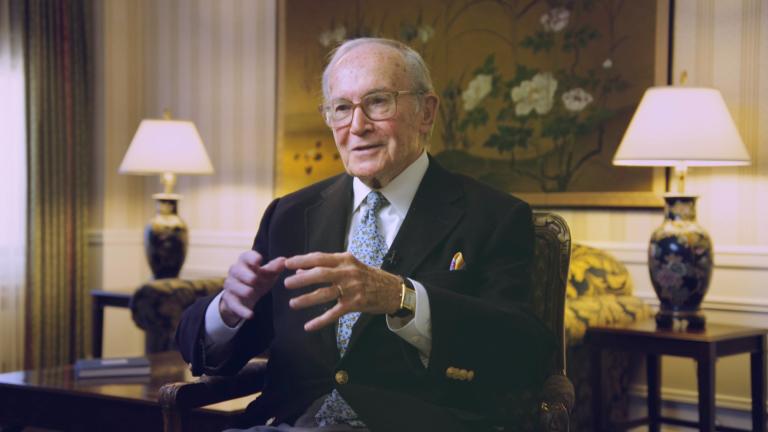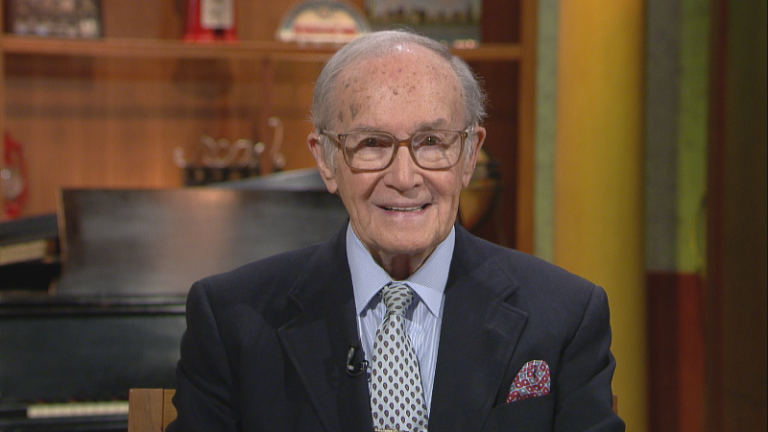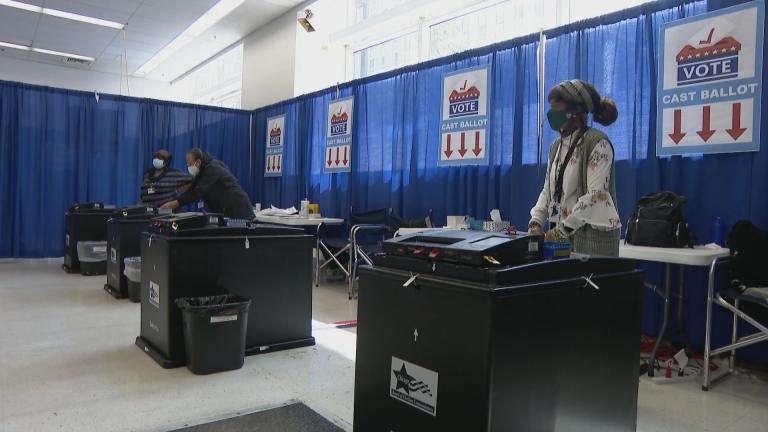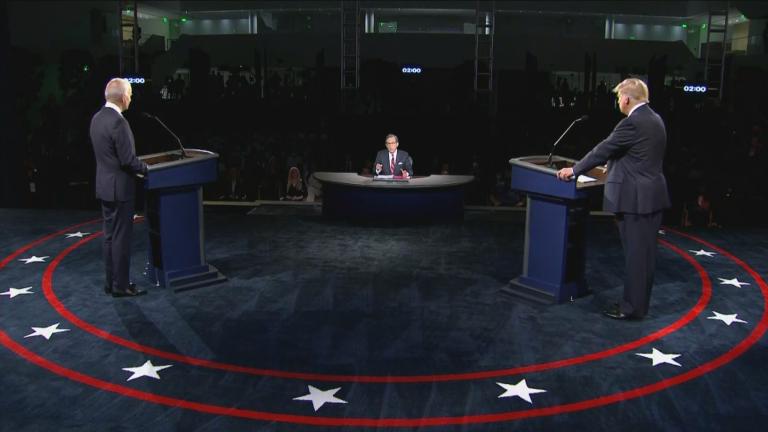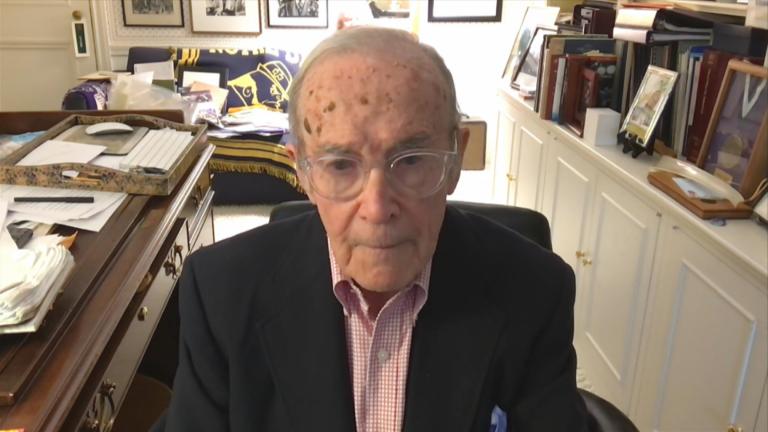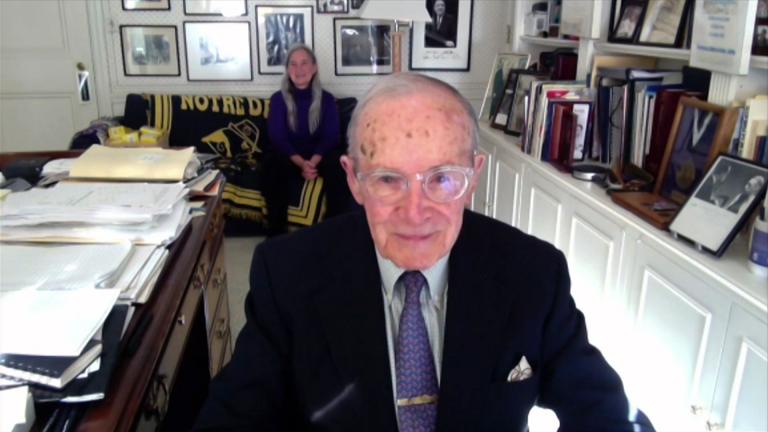In a speech to television executives on May 9, 1961, then-FCC Chairman Newton Minow famously called TV a “vast wasteland.” The speech caused a sensation, and “vast wasteland” became a catchphrase that would follow Minow his entire career.
But daughter Nell Minow recalls a different event that day: her father-daughter Brownie dinner. After giving his speech, Newt Minow flew home to Glencoe, Ill., to make sure he made it in time for the family event. He then flew back to Washington, D.C., for work.
“I actually found a memo on FCC stationery that he’d written to my mother,” Nell Minow said, asking his wife, Josephine, to remind him of the date of the Brownie dinner.
Nell Minow said that kind of effort was emblematic of who her dad was as both a man and a father.
“He was always there for us, always the best listener, always the best cheerleader, always setting the best example,” Nell Minow said. “He was a great, great, great father.”
Newt Minow died Saturday at home in Chicago at the age of 97, as WTTW News reported. The attorney and educator served as chairman of the FCC under President John F. Kennedy in the early 1960s. Though Minow’s tenure was short, he left a permanent stamp on the broadcasting industry through government steps to foster satellite communications and his outspoken advocacy for quality in television.
That 1961 speech to the National Association of Broadcasters led to the creation of a public broadcasting system in the U.S.
“When my father got to Washington to become the chairman of the FCC at age 34,” Nell Minow said, “something that he and President Kennedy talked about right away was that they were shocked to find they had both come from cities with what was then called educational television — but Washington, D.C., didn’t have it. Neither did New York. … It was definitely his [Minow’s] experience with WTTW that got him determined to bring something like that to the entire country.”
WTTW was founded in 1955. Newt Minow was a crucial figure in the station’s later growth and a longtime WTTW News supporter. He was a former chairman and longtime member of the Board of Trustees.
He was especially passionate about quality news programming and children’s television, Nell Minow said, adding that her father helped secure the initial funding for “Sesame Street.”
“Even though he’s famous for complaining about what was wrong with TV, he really delighted in what was right about TV,” Nell Minow said. “He’d say, ‘Come over here. You’ll like this.’”
Among his favorites, his daughter said, were “What’s New?”, “The Sopranos,” CBS “Sunday Morning,” Ken Burns’ documentaries and films on Turner Classic Movies. And he “loved, loved, loved ‘Chicago Tonight.’ … WTTW and PBS were very dear to his heart.”
Video: Joining “Chicago Tonight” to discuss Newt Minow’s legacy are former “Chicago Tonight” contributor Carol Marin, former “Chicago Tonight” host Phil Ponce and Chris Abbinante, a partner at Sidley Austin. (Produced by Andrea Guthmann)
In an interview Saturday, former “Chicago Tonight” host Phil Ponce recalled Newt Minow’s unwavering belief in fairness and the importance he placed on an informed and civically engaged country.
“It’s a huge loss to the city, and it’s a huge loss to the country, and it’s a huge loss to those of us that loved him,” Ponce said.
“He [Minow] learned in college at Northwestern [University] to ask the questions, ‘What do you mean?’ and ‘How do you know?,’” daughter Martha Minow said. “And he taught generations to ask those questions, and therefore, to listen really well and find ways to deal with disagreements.”
“That is the kind of contribution and set of values that he had and that we honestly think the whole country needs now more than ever,” Martha Minow continued, adding that her father was a “masterful problem solver.”
“It does seem to be a time to me when the idea of idea of the public spirit … seems to have disappeared,” Nell Minow said. “My father was hugely committed to bringing together people of different ideas and finding common ground. That’s not something we see enough of now. He was somebody who was always thinking to the future and had tremendous patience.”
Among other achievements, Newt Minow was involved in every presidential debate, beginning with that of Kennedy and Richard Nixon. Minow was also instrumental in getting legislation passed to launch the first telecommunications satellite, owned by AT&T.
“He told Kennedy it was more important than putting a man on the moon,” Nell Minow said. “The communications satellite will put ideas into space, and ideas last longer.”
At 97, Newt Minow was still teaching at the Osher Lifelong Learning Institute (OLLI) at Northwestern University, alongside his daughter Mary Minow. He taught problem solving, literature, film and philosophy. He had planned to teach another class this fall, Nell Minow said.
Martha Minow said the family received condolences from people in their 20s through to their 90s — a testament to how many people her father touched.
“He had a wonderful, meaningful life,” Martha Minow said. “He was the child of immigrants. All the way from that experience to working for presidents of both parties, being appointed on commissions, … envisioning public media, envisioning the debates for presidential campaigns — and seeing some of the things he had hoped for coming to fruition.”
The Associated Press contributed to this report.

